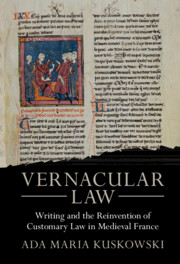Book contents
- Vernacular Law
- Studies In Legal History
- Vernacular Law
- Copyright page
- Dedication
- Contents
- Figures
- Acknowledgments
- A Note on the Text
- Introduction Vernacular Writing and the Transformation of Customary Law in Medieval France
- Part I Written Custom and the Formation of Vernacular Law
- Part II Political and Intellectual Tensions
- Part III Implications
- 6 Custom in Lawbooks and Records of Legal Practice
- 7 Dynamic Text: Dialectic, Manuscript Culture, and Customary Law
- 8 Implications of Circulating Text: Crafting a French Common Law
- Conclusion Lasting Model and Professional Community
- Bibliography
- Index
7 - Dynamic Text: Dialectic, Manuscript Culture, and Customary Law
from Part III - Implications
Published online by Cambridge University Press: 27 October 2022
- Vernacular Law
- Studies In Legal History
- Vernacular Law
- Copyright page
- Dedication
- Contents
- Figures
- Acknowledgments
- A Note on the Text
- Introduction Vernacular Writing and the Transformation of Customary Law in Medieval France
- Part I Written Custom and the Formation of Vernacular Law
- Part II Political and Intellectual Tensions
- Part III Implications
- 6 Custom in Lawbooks and Records of Legal Practice
- 7 Dynamic Text: Dialectic, Manuscript Culture, and Customary Law
- 8 Implications of Circulating Text: Crafting a French Common Law
- Conclusion Lasting Model and Professional Community
- Bibliography
- Index
Summary
This chapter explores how writing affected the nature of custom itself. The writing of custom did not fix or petrify custom and end its malleability or creativity, as scholars have assumed. Drawing on the work of literary scholars on the nature of medieval vernacular text and manuscript culture, I argue instead that each manuscript provided one authoritative version of custom and constituted one voice in a conversation over custom that continued with written text. This conversation can be seen where differences between manuscripts show diverging opinions about proper custom. This, in turn, meant that custom remained creative and dynamic even in written form. The purpose of the coutumiers was not to copy practised custom and faithfully record it with perfect accuracy in text. Rather, the coutumiers were meant to change the patterns of thought of ‘those who would hear or read the text’ and show them how to think in a legal manner, like a lawyer, judge, or sophisticated litigant. Teaching modes of thought rather than rules permitted those who did not spend years in university to understand the framework and rhetoric of lay courts, and enabled them to navigate these through changing rules, time, and circumstance.
Keywords
- Type
- Chapter
- Information
- Vernacular LawWriting and the Reinvention of Customary Law in Medieval France, pp. 265 - 314Publisher: Cambridge University PressPrint publication year: 2022

